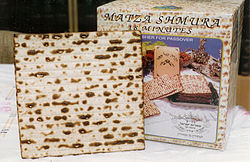逾越节薄饼

逾越节薄饼[1](希伯来语:מַצָּה )是一种无酵饼,也是犹太人饮食的一部分,逾越节期间犹太人会食用逾越节薄饼。
根据《妥拉》的记载,上帝命令以色列人[2](犹太人和撒马利亚人)在为期7天的逾越节期间只能吃无酵饼[3]。
参考文献[编辑]
- ^ Trachtenberg, Joshua. https://www.sacred-texts.com/jud/jms/jms43.htm
|chapterurl=缺少标题 (帮助). Jewish Magic and Superstition. Philadelphia: University of Pennsylvania Press. 13 February 2004: 333 (2004) [Feb 6, 2023]. ISBN 9780812218626. (原始内容存档于2023-12-05).Maẓẓah—unleavened bread.
- ^ Exodus 12:15
- ^ In Time for the Holiday: What is Matzah? How is it Baked?. IsraelNationalNews.com. 25 March 2010 [2013-02-19]. (原始内容存档于2021-10-18).
According to Jewish Law, once matzo is baked, it cannot become hametz. However, some Ashkenazim, chiefly in Hassidic communities, do not eat [wetted matzo], for fear that part of the dough was not sufficiently baked and might become hametz when coming in contact with water.
